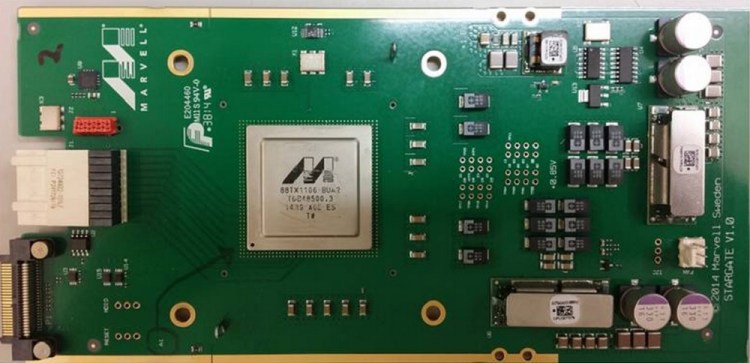Marvell is expanding into the market for network search engine chips with a product that can juggle 8 million simultaneous streams.
The Santa Clara, Calif.-based chip makers says its new Questflo chip is a search coprocessor that has four times the capacity of other products, but it uses only a third of the electrical power. Using that performance-power efficiency as its edge, Marvell hopes it can grab market share as a new entrant against rivals such as Broadcom. The new chip can handle 2.4 billion searches per second, but it only consumes about 25 watts of power.
The new chip will enable next-generation mobile networks and Internet-of-things processing, John Chiang, director of marketing for a business group at Marvell, told VentureBeat. The Internet of things brings smart connectivity to everyday devices.
“Every person is going to have multiple connected wearables,” Chiang said. “We need a network that can support that.”
June 5th: The AI Audit in NYC
Join us next week in NYC to engage with top executive leaders, delving into strategies for auditing AI models to ensure fairness, optimal performance, and ethical compliance across diverse organizations. Secure your attendance for this exclusive invite-only event.
The Questflo 98TX1100 family of network search coprocessors may not sound sexy. But this kind of chip is essential to supporting communications infrastructure in a city or neighborhood that would otherwise come to its knees with the surge of traffic from newly connected devices, such as thermostat sensors. Chiang said the new chips will support mobile devices, the Internet of things, and automotive connectivity.
These chips will likely cost in the hundreds of dollars, and they could be used by the dozen in network edge routers and data center servers that cost hundreds of thousands of dollars. Specifically, the chips can be used in carrier and enterprise service/edge routers, security appliances, network probes, data center switches, server load-balancers, and new classes of software-defined networks. The chips can handle 8 million flows, where, for example, a single flow could be a Netflix movie stream to your home.
While Marvell is new to this market, it makes about seven or so of the other chips that would go into this kind of network box. In that respect, it’s a logical expansion market for Marvell, Chiang said. The device works with Marvell’s Xelerated programmable networks processors, Prestera family of Ethernet packet processors, or any custom networking chips. Marvell argues that the infrastructure built for today’s mobile networks will buckle under the added stress of Internet-of-things traffic without this type of technology.
“As next-generation networking equipment adopts new paradigms based on highly flexible and highly scalable flow-based services, Marvell is entering the market as a credible supplier of network search technology. The magnitude of scaling required by these new equipment designs can only be realized using innovative new approaches like that represented by Questflo,” said Bob Wheeler, principal analyst for networking at The Linley Group, which will hold its Linley Tech Processor conference in Santa Clara, Calif., this week. Marvell will describe the chip more at the event.
The chip is available in sample quantities now.

